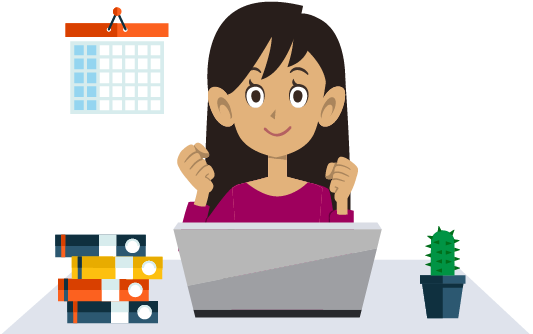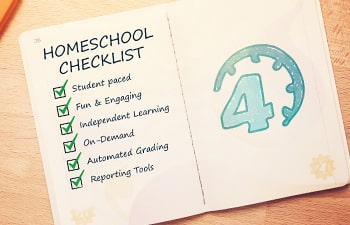By customizing an education to your teen, instead of the other way around, you’ll discover that getting your high schooler on board with a homeschool plan is not as challenging as it may seem!
Let’s look at five tactics to help you and your student collaborate together for a successful high school year.
Create Goals
Before the first book is cracked, the first computer lesson viewed, or the first worksheet started, you and your teen will want to have a dedicated discussion about what each of you want to get out of this homeschool year. Set goals for yourself as a parent, and help your student set their own goals. Sure, you may find that you have very different objectives, but a discussion is a starting place for gauging where the similarities and differences lie, and finding as much common ground as possible. Does your teen want to get a part-time job? Do you want them to be more focused on their grades? You might be able to compromise on a trial period where she can show you they are serious about school and is able to tackle the added responsibility of an evening or weekend position.
Map Out a Plan
After you have your goals in mind, the next logical step is to turn them into actionable steps that you can accomplish in the coming year. High schoolers may need guidance with this part. Being able to break down a mission into achievable actions is a skill that tends to come with life experience. Involving your student in this process will go more smoothly if you already know what your teen’s learning style is. If they are visually oriented, for example, having a graphic planner in front of you as you plan out your year will help immensely. There are many ways to plan for the coming homeschool year, though, including planning:
- by credit hours needed
- for college or career goals
- how to include individual interests
- around an extracurricular schedule
Once you have a general plan in mind, you may want to break it down even further to help you plan month to month and even week to week. Time4Learning includes a homeschool planner to make that task easier.
Choose a Curriculum
Choosing curriculum in the high school years is probably one of most important decisions you and your high schooler will make. The more input your teen has on the resources they will use this year, though, the more smoothly your back-to-homeschool period will likely be. As you discuss and browse options together, there are multiple factors to consider before making your final choices. Choosing the best homeschool curriculum depends on:
- understanding all the different types of curriculum possibilities (e.g. online, textbook-based, literature-focused)
- knowing how your teen best learns (e.g. visually, hands-on, discussion)
- financial feasibility
- how much a parent wants to be involved with the daily teaching
Another factor to consider when choosing curriculum is a student’s overall academic goals. Does your student want to attend college? Then you’ll probably want to integrate a foreign language curriculum into your plans. Is your child aiming for a STEM career? Then you may need to consider a homeschool high school STEM program to bolster their learning. Talking these alternatives through with your teen will help you pin down the best mix of resources for the year ahead.
Agree on assessments
Unless your high schooler will be enrolled in a virtual school or private diploma-granting institution, the grades and credits your homeschooler receives will be up to you, as the parent. This doesn’t have to be scary, though. Information on assessing and assigning credits to your high school homeschooler is abundant. Homeschool.com has some wonderful information in this area including a template for determining a high schooler’s G.P.A., downloadable homeschool credit planners, and information on turning your student’s grades into a professional transcript for college admissions.
Then it’s important to consult with your teen on what your expectations will be regarding grades, and what the consequences will be if they do not meet those. A frank conversation about the importance of grades to their future college plans and career choices can move even the most reluctant student toward a better understanding of the importance of academic progress.
Stay Accountable
The final element of back-to-homeschool motivation for your high schooler should be a personal one. For a teen to feel truly in charge of their own learning, they need an accountability plan. Being accountable to oneself is a transitional step toward adulthood, and there is no better opportunity than homeschooling for a teen to practice this life lesson. In general, you can create a culture of accountability in your home by making sure that each person in the family is taking responsibility for their own actions.
Specifically, with homeschooling, though, this could take the form of a teen keeping a journal or spreadsheet of their daily progress, writing a weekly summary of what they’ve learned, or logging concepts they realize they need more practice with. At this stage of the academic spectrum, parents should see themselves more as mentors than hand-holders. By allowing a teen’s success to be their own, as well as their failures, you’re teaching a teen important skills in independence and accountability. Having a personal stake in their own education is the key to getting your teen on the back-to-homeschool bandwagon.







